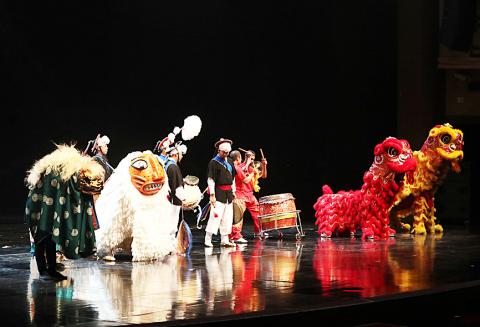The culture and tourism ministers of South Korea, Japan and China yesterday agreed to step up cultural, sports and people-to-people exchanges, despite tensions over trade and their shared history.
Their meeting in the South Korean port city of Incheon came amid an escalating trade and diplomatic dispute between Japan and South Korea, as well as an intensifying regional rivalry with a rising China.
The three countries promote cultural exchanges, but differing views on their shared history, in particular the legacy of the Japan’s occupation of the Korean Peninsula and parts of China, have often hampered those efforts.

Photo: EPA-EFE
South Korean Minister of Culture, Sports and Tourism Park Yang-woo, Japanese Minister of Education, Culture, Sports, Science and Technology Masahiko Shibayama and Chinese Minister of Culture and Tourism Luo Shugang (雒樹剛) promised more cultural, sports and people-to-people exchanges over the next 10 years.
During that time, Tokyo is to host next year’s Summer Olympics and Beijing the 2022 Winter Olympics.
“The three countries made it clear that future cultural exchanges and cooperation should be conducted based on the principles of mutual respect and reciprocity, and in a way that promotes cultural diversity and peace in East Asia,” the ministers said in a joint statement.
Park and Luo held separate talks with Japanese Minister of Land, Infrastructure, Transport and Tourism Keiichi Ishii and adopted another declaration pledging efforts to boost cooperation on tourism.
Park and Shibayama shared a cordial handshake alongside Luo as they signed agreements aimed at expanding three-way cultural programs, in contrast to the frosty exchanges between the South Korean and Japanese foreign ministers in the past few months.
Park and Shibayama on Thursday held separate talks, in which they agreed to continue cultural cooperation, despite the political and economic feud, the South Korean Ministry of Culture, Sports and Tourism said in a statement.
More civilian exchanges were needed to mend ties, Shibayama was quoted as saying by Japan’s Kyodo news agency.
“Japan-South Korea relations are in a tough spot and deepening exchanges at the grassroots level through cooperation in the cultural field will help improve relations,” Shibayama told reporters after the three-way meeting.
Park later yesterday also met with Ishii and they agreed on the need for more tourist exchanges and to work to “tackle relevant issues,” the ministry said.
Relations between South Korea and Japan worsened late last year after the South Korean Supreme Court ordered compensation for some Koreans forced to work at Japanese firms during Japan’s 1910-1945 occupation.
This month, Japan stripped South Korea of fast-track export status, which prompted South Korea to drop Japan from its own list and end a bilateral intelligence-sharing accord.
The row has taken a toll on tourist exchanges, with South Koreans canceling travel plans as part of a boycott of Japanese products and services.
The number of South Korean visitors to Japan last month fell to its lowest in nearly a year, the Japan Tourism Agency said last week.

LONG FLIGHT: The jets would be flown by US pilots, with Taiwanese copilots in the two-seat F-16D variant to help familiarize them with the aircraft, the source said The US is expected to fly 10 Lockheed Martin F-16C/D Block 70/72 jets to Taiwan over the coming months to fulfill a long-awaited order of 66 aircraft, a defense official said yesterday. Word that the first batch of the jets would be delivered soon was welcome news to Taiwan, which has become concerned about delays in the delivery of US arms amid rising military tensions with China. Speaking on condition of anonymity, the official said the initial tranche of the nation’s F-16s are rolling off assembly lines in the US and would be flown under their own power to Taiwan by way

CHIP WAR: The new restrictions are expected to cut off China’s access to Taiwan’s technologies, materials and equipment essential to building AI semiconductors Taiwan has blacklisted Huawei Technologies Co (華為) and Semiconductor Manufacturing International Corp (SMIC, 中芯), dealing another major blow to the two companies spearheading China’s efforts to develop cutting-edge artificial intelligence (AI) chip technologies. The Ministry of Economic Affairs’ International Trade Administration has included Huawei, SMIC and several of their subsidiaries in an update of its so-called strategic high-tech commodities entity list, the latest version on its Web site showed on Saturday. It did not publicly announce the change. Other entities on the list include organizations such as the Taliban and al-Qaeda, as well as companies in China, Iran and elsewhere. Local companies need

CRITICISM: It is generally accepted that the Straits Forum is a CCP ‘united front’ platform, and anyone attending should maintain Taiwan’s dignity, the council said The Mainland Affairs Council (MAC) yesterday said it deeply regrets that former president Ma Ying-jeou (馬英九) echoed the Chinese Communist Party’s (CCP) “one China” principle and “united front” tactics by telling the Straits Forum that Taiwanese yearn for both sides of the Taiwan Strait to move toward “peace” and “integration.” The 17th annual Straits Forum yesterday opened in Xiamen, China, and while the Chinese Nationalist Party’s (KMT) local government heads were absent for the first time in 17 years, Ma attended the forum as “former KMT chairperson” and met with Chinese People’s Political Consultative Conference Chairman Wang Huning (王滬寧). Wang

CROSS-STRAIT: The MAC said it barred the Chinese officials from attending an event, because they failed to provide guarantees that Taiwan would be treated with respect The Mainland Affairs Council (MAC) on Friday night defended its decision to bar Chinese officials and tourism representatives from attending a tourism event in Taipei next month, citing the unsafe conditions for Taiwanese in China. The Taipei International Summer Travel Expo, organized by the Taiwan Tourism Exchange Association, is to run from July 18 to 21. China’s Taiwan Affairs Office spokeswoman Zhu Fenglian (朱鳳蓮) on Friday said that representatives from China’s travel industry were excluded from the expo. The Democratic Progressive Party government is obstructing cross-strait tourism exchange in a vain attempt to ignore the mainstream support for peaceful development